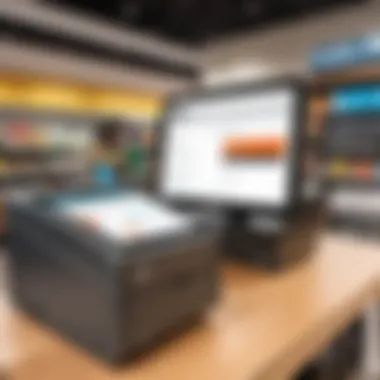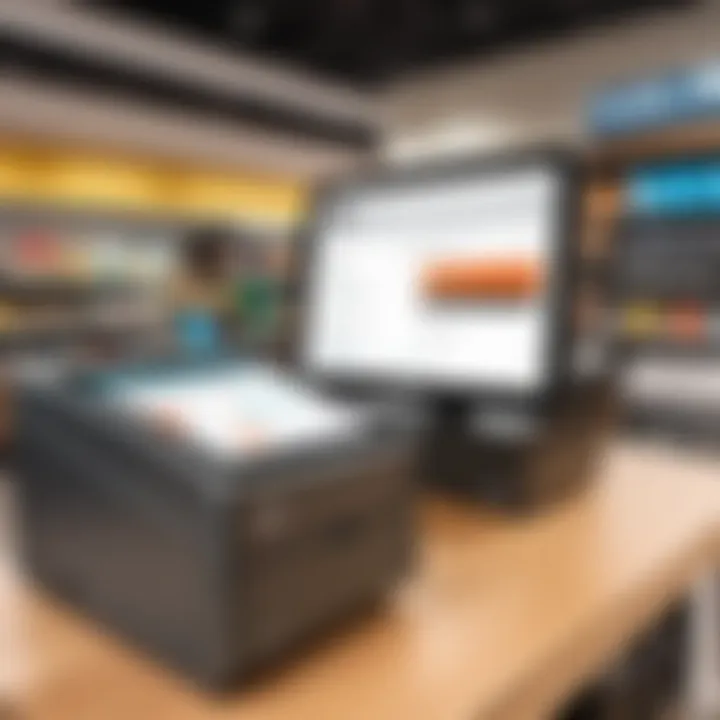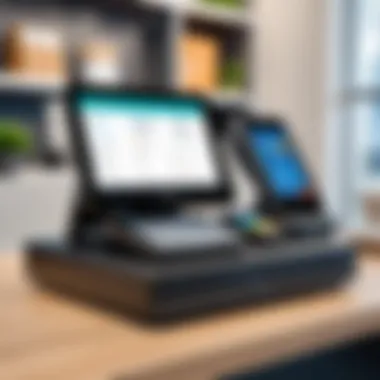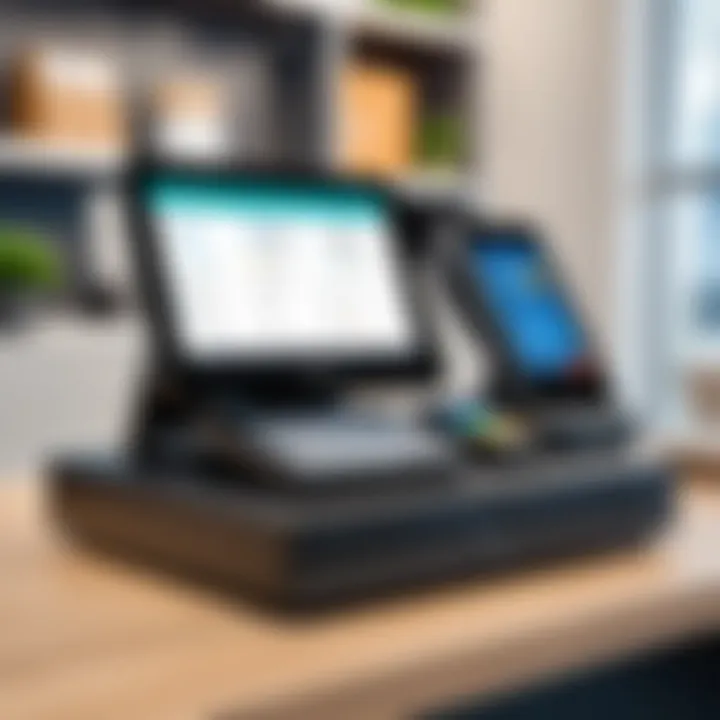Comprehensive Exploration of NetSuite Retail POS System


Intro
In today's fast-paced retail environment, having an efficient point-of-sale (POS) system is crucial for success. The NetSuite Retail POS stands out as a comprehensive solution tailored for the modern retailer. This article delves into the core features, pricing structures, and real-world applications of the NetSuite Retail POS, providing valuable insights for IT professionals, business owners, and decision-makers.
Key Features
Overview of Core Features
NetSuite Retail POS offers a variety of features that cater to the diverse needs of retail businesses. One of its most significant advantages is real-time inventory management. This allows retailers to keep track of stock levels dynamically, minimizing the risk of overstocking or stockouts.
Another notable feature is the centralized customer relationship management (CRM) capability. With this system, retailers can keep detailed profiles of customers, including purchase history and preferences, leading to more personalized service. Additionally, NetSuite Retail POS supports multi-channel selling, enabling businesses to manage in-store and online sales within a single platform.
Furthermore, the solution includes robust reporting and analytics tools. Retailers can generate detailed sales reports and track performance metrics, facilitating data-driven decision making. Overall, these features work collaboratively to enhance operational efficiency and improve customer experiences.
User Interface and Experience
The user interface of NetSuite Retail POS is designed to be intuitive. Its layout allows for easy navigation, making it accessible for employees of varying tech-savviness. Staff can quickly process transactions, access product information, and manage customer inquiries, which can significantly increase in-store efficiency.
Moreover, the system is adaptable to various retail formats, from small boutiques to larger department stores. The interface can be customized to meet specific business needs, ensuring that users can tailor their experience for optimal performance. The overall user experience is further enhanced by a responsive design that functions well across different devices.
Pricing and Plans
Overview of Pricing Models
Understanding the pricing structure of NetSuite Retail POS is crucial for businesses considering this investment. The pricing model generally operates on a subscription basis. This allows businesses to select plans based on their size and particular needs. However, pricing may vary significantly, influencing total cost based on the number of registers and users.
Comparison of Different Plans
NetSuite Retail POS offers several plans, each designed for different types of businesses. For small retailers, there might be an entry-level plan that provides basic functionalities at a lower price point. Medium and larger retailers may opt for more advanced plans that include additional features such as enhanced analytics and support for multiple locations.
"Choosing the right plan is essential to maximizing your investment in a POS system. Studies show that businesses that align their software with operational needs report higher satisfaction and performance."
In summary, understanding how the pricing aligns with core features can help businesses make a more informed decision. Each plan should be evaluated based on specific operational needs and budget constraints.
Preface to NetSuite Retail POS
NetSuite Retail POS plays a vital role in the modern retail landscape. The system integrates various functions crucial for smooth operations and enhances customer service. Today, businesses face intense competition, making it essential to adopt robust solutions to manage sales, inventory, and customer relationships. A well-implemented POS system can streamline these processes, offering a significant edge over competitors.
Overview of NetSuite
NetSuite is an enterprise resource planning (ERP) software that provides a unified business management solution. It includes functionality not only for accounting but also for inventory and order management. This integration creates seamless workflows between back-end and front-end processes. NetSuite Retail POS is specifically designed for retailers, allowing businesses to handle transactions efficiently while keeping track of inventory in real-time. The system is cloud-based, which means that it can be accessed from various locations. As such, it facilitates both in-store and online retail operations.
Businesses using NetSuite benefit from a centralized platform. This platform helps in making data-driven decisions because all necessary information is easily accessible. Additionally, the scalability of NetSuite allows companies to adjust their operations as they grow, making it an ideal choice for both small businesses and large enterprises.
Importance of POS Systems in Retail
The importance of POS systems cannot be overstated in today's retail environment. A POS system serves as the backbone for retail operations, aiding in transaction processing and customer service management. Here are key points illustrating its significance:
- Real-time Information: It provides updates on sales and inventory levels instantly. This feature helps retailers make informed decisions quickly.
- Enhanced Customer Experience: A well-functioning POS system reduces wait times and check-out errors, which leads to greater customer satisfaction.
- Sales Analytics: Businesses gain insights into sales trends and customer preferences through comprehensive reporting, which enhances marketing strategies.
- Employee Management: The system allows retailers to monitor employee performance and manage schedules effectively.
"The right POS system is an investment that pays dividends in operational efficiency and enhanced customer satisfaction."
In summary, a reliable POS system like NetSuite Retail POS is crucial for any retail establishment aiming to thrive in a competitive market. It improves not only the efficiency of the business but also ensures customer loyalty through superior service.
Core Features of NetSuite Retail POS
The core features of the NetSuite Retail POS system play a crucial role in defining its effectiveness in retail environments. This system is designed to streamline operations, enhance customer satisfaction, and facilitate management tasks. Understanding these features is key for businesses considering the integration of such a system. In this section, we will explore the pivotal aspects of NetSuite Retail POS that contribute to its reputation as a comprehensive retail solution.
User Interface and Experience
The user interface of NetSuite Retail POS is designed with intuitiveness and efficiency in mind. A streamlined interface allows staff to process transactions smoothly, minimizing the learning curve for new users. The layout of buttons and menus is crucial; it is thoughtfully arranged for quick access to essential functions. This responsiveness not only saves time but also reduces errors during checkout.


Another important aspect is the mobile compatibility. Retail staff can use tablets or smartphones, which enhances customer interactions and allows flexibility at the point of sale.
In practice, a positive user experience can lead to increased employee productivity, resulting in better service delivery to customers. Access to training resources within the interface further supports the ongoing development of staff skills.
Inventory Management Capabilities
Efficient inventory management is vital for any retail operation, and NetSuite Retail POS excels in this area. The system provides real-time inventory tracking and management, allowing businesses to maintain optimal stock levels. This feature helps prevent overstocking and stockouts, both of which can negatively affect sales.
NetSuite's inventory management integrates with other retail operations seamlessly. It allows for automated reordering processes, guiding businesses on when to replenish stock based on predefined thresholds. Users can also categorize inventory by various parameters, such as sales velocity or seasonality. This capability enables informed decision-making and reduces carrying costs.
In addition, the system allows tracking across multiple locations, which is indispensable for retailers with physical stores and online platforms. Being able to see what stock is available where, in real-time, enhances operational agility.
Sales Tracking and Reporting
Sales tracking is another pivotal feature that supports business analytics and decision-making. NetSuite Retail POS offers comprehensive sales data that can be analyzed through custom reports. Users can access critical metrics, such as daily sales figures, transaction types, and peak sales times. This data aids retailers in seeing trends over time and making adjustments accordingly.
The reporting function is not limited to sales; it also includes insights into customer behavior. By understanding purchasing patterns, businesses can tailor their marketing strategies and improve inventory decisions. This level of granularity in reporting contributes significantly to overall business performance.
Customer Relationship Management Functionality
The built-in customer relationship management (CRM) functionalities of NetSuite Retail POS enhance a retailer’s ability to engage with customers. An effective CRM system enables businesses to collect and analyze customer data, tracking interactions across various touchpoints. This information is invaluable for building personalized experiences and fostering customer loyalty.
Through customer profiles, retailers can access purchase histories and preferences, which inform targeted promotions and marketing strategies. Additionally, managing customer feedback becomes more straightforward, allowing businesses to adapt to evolving consumer expectations. Ultimately, robust CRM functionality ensures that retailers not only attract customers but also retain them.
Integration Features
Integration features are a pivotal element of the NetSuite Retail POS system. These features enable seamless connectivity with various platforms and applications, enhancing operational efficacy for retail businesses. As retail operations grow more complex, the ability to integrate with e-commerce, accounting software, and third-party applications becomes indispensable. Organizations that prioritize integration can leverage data more effectively, streamline processes, and respond rapidly to market demands.
E-commerce Integration
E-commerce integration is essential for modern retail operations. With the increase in online sales, retail businesses must synchronize their in-store and online activities. NetSuite Retail POS offers robust capabilities for e-commerce integration, allowing businesses to manage inventory, orders, and customer data across multiple channels.
The benefits of this integration are notable:
- Unified Inventory Management: Businesses can track inventory in real-time across all sales channels. This reduces the risk of stockouts or overstock situations, ensuring that customer demand is met efficiently.
- Streamlined Order Processing: Orders from online platforms like Shopify or WooCommerce flow smoothly into the NetSuite system. This simplifies the fulfillment process and accelerates shipping times.
- Consistent Customer Experience: Customer data collected from various channels can be consolidated. This helps retailers understand purchase behaviors better and personalize marketing efforts effectively.
Accounting and Financial Software Integration
For retail businesses, effective financial management is crucial. The integration of NetSuite Retail POS with accounting and financial software streamlines bookkeeping and enhances financial oversight.
Some key points regarding this integration include:
- Automated Financial Reporting: Financial data can be generated automatically, reducing manual entry errors and ensuring accuracy. This is critical for financial health monitoring and compliance.
- Real-time Data Sync: Changes made in sales, returns, or expenses are immediately reflected in financial reports. This provides up-to-date financial visibility, aiding in timely decision-making.
- Simplified Tax Management: Integration with accounting software can aid in tax calculations by pulling in sales data. This capability simplifies the tax filing process and ensures compliance with regulations.
In summary, integrating accounting and financial software with NetSuite Retail POS fosters better financial management, allowing businesses to focus on growth and strategy rather than administrative tasks.
Third-party Application Connections
The ability to connect with third-party applications is another significant benefit of NetSuite Retail POS. Many retailers utilize specialized software to enhance specific areas of their operations, such as marketing or customer service. The flexibility of third-party integrations allows businesses to customize their systems to meet unique needs.
Key advantages include:
- Enhanced Functionality: Retailers can extend the capabilities of NetSuite by connecting to applications like Mailchimp for email marketing or Zendesk for customer support.
- Data Sharing: Information from various applications can be synchronized, benefiting customer engagement and loyalty programs. A centralized system minimizes data discrepancies across platforms.
- Scalability: As businesses grow, they often require new tools and solutions. The capacity to easily integrate third-party apps means businesses can adapt their software landscape without significant disruptions.
Integrating third-party applications with NetSuite Retail POS ensures that retail businesses can operate at their optimal level, improving efficiency and customer satisfaction.
Benefits of Implementing NetSuite Retail POS
Implementing NetSuite Retail POS provides numerous advantages that can significantly affect a retail business's performance and growth. Understanding these benefits is crucial for businesses seeking to optimize their operations and improve overall efficiency. Effective POS systems are not just about transaction processing. They encompass a larger ecosystem that influences customer interactions, inventory management, and business profitability. Below are three essential benefits of adopting NetSuite Retail POS, each playing a vital role in retail success.
Improved Operational Efficiency


NetSuite Retail POS centralizes numerous functions, simplifying various tasks associated with retail operations. By streamlining processes, it automates tasks such as inventory tracking, sales reporting, and customer management. This means less time is spent on routine administrative work. Retailers can focus on what really matters: driving sales and enhancing customer satisfaction.
For instance, an employee can quickly access inventory levels during customer inquiries, reducing waiting times. Furthermore, all data is updated in real-time, mitigating errors associated with manual data entry. Operational efficiency also involves smarter stock management. With NetSuite, retailers benefit from insights into purchasing patterns, helping optimize stock levels and ordering processes.
Enhanced Customer Experience
A retail business thrives on its customer relationships. NetSuite Retail POS helps develop these relationships by personalizing customer experiences. Through customer data and purchase histories, retailers can tailor promotions and suggestions to individual needs. This functionality can improve customer loyalty significantly.
Moreover, the system supports multiple sales channels, ensuring a seamless customer experience across in-store and online platforms. Quick transactions contribute to less waiting time, which customers appreciate. Employing modern payment methods, from credit cards to digital wallets, aligns with consumer preferences today, ultimately enhancing satisfaction.
Real-time Data Access
Access to real-time data is a powerful tool for retailers. With NetSuite Retail POS, all data related to sales, inventory, and customer behavior is updated immediately. This access empowers decision-makers to act quickly based on current performance metrics rather than relying on outdated information. Analyzing real-time data allows retailers to make informed decisions, from adjusting pricing strategies to responding to purchasing trends.
Furthermore, business intelligence features within NetSuite can identify underperforming areas. Retailers can implement changes promptly to counteract potential losses. Real-time access reduces risks associated with miscalculations and empowers businesses to stay agile in a fast-paced market.
"With real-time data, businesses have the ability to react swiftly to market changes, leading to better sales outcomes and customer alignment."
Cost Considerations and Pricing Models
Understanding the cost considerations and pricing models associated with NetSuite Retail POS is essential for businesses contemplating its adoption. This section delineates the structure of costs involved, enabling better financial planning and decision-making. Recognizing the various pricing components helps businesses allocate budgets effectively and understand value propositions tied to the investment in technology.
Subscription Pricing Structure
NetSuite operates under a subscription-based model, which offers flexibility for businesses of varied sizes. The subscription fees can fluctuate based on numerous factors including the scale of operations, type of modules included, and number of users accessing the system. Generally, these subscriptions encompass licenses for the POS system and often include cloud access as well.
Such a pricing model allows enterprises to avoid a heavy upfront investment, making it accessible for growing businesses. The typical options range from basic functionalities tailored for smaller businesses to comprehensive packages designed for larger retail organizations. Moreover, businesses must consider annual renewal costs, which can affect long-term budgeting.
Implementation Costs
Implementing NetSuite Retail POS involves additional costs that are crucial to factor into the overall budget. These costs can vary significantly based on the complexity of the business processes being integrated and the customization needed for the system. Installation often requires resources for data migration, system configuration, and user training.
Businesses might need to deploy external consultants or specialists in some cases, thus adding to the implementation cost. It is imperative to conduct a thorough assessment of specific needs, and ensure resources are allocated for a smooth transition. The overall cost can markedly influence how quickly a business can realize the benefits of the system.
Ongoing Maintenance Fees
Once the system is in place, ongoing maintenance fees should not be overlooked. This encompasses software updates, system checks, and technical support. Regular updates are essential for security and functionality enhancement. Costs may vary based on the level of support decided upon by the business, ranging from basic access to premium 24/7 support.
Additionally, depending on the size of the retail operation, businesses might experience varying maintenance costs, which must be monitored closely. Ensuring that there is a budget for these fees can help prevent unexpected expenditures over time.
"Understanding the cost landscape of NetSuite Retail POS is pivotal for making informed decisions regarding its deployment and long-term usage."
User Experiences and Feedback
User experiences and feedback serve as a vital component in evaluating the effectiveness of the NetSuite Retail POS system. This segment provides insights not only from the retailers who implement this system but also highlights the operational impact and user satisfaction. Understanding these elements is essential for potential buyers as it informs decisions based on real-world applications rather than theoretical predictions. The depth of user feedback can reveal both the strengths and weaknesses inherent in the platform, guiding decision-makers in their evaluation process.
Case Studies from Retailers
Several retailers have shared their experiences with NetSuite Retail POS, each providing a unique perspective on its capabilities. For example, a medium-sized apparel retailer observed a significant increase in transaction speed and accuracy post-implementation. This retailer reported that the user-friendly interface allowed staff to process sales swiftly, minimizing wait times for customers.
Furthermore, a case study from a boutique electronics store highlighted how the inventory management features helped in tracking stock levels effectively. This retailer was able to reduce overhead costs by employing real-time data to make informed restocking decisions. Overall, these case studies provide practical insights into how NetSuite can enhance various aspects of retail operations.
Common Challenges Faced
Despite its many advantages, the implementation of NetSuite Retail POS is not without challenges. Some users reported a steep learning curve for their staff. Initial setup and training took longer than anticipated, which led to temporary disruptions in daily operations. In addition, some retailers expressed concerns regarding the integration with existing systems. Aligning NetSuite with other software solutions can be complex, requiring additional technical expertise.
Moreover, a few businesses noted that customer support could sometimes be slow in responding to inquiries or technical issues. This aspect highlights the importance of having adequate support structures in place during and after the implementation phase.
In summary, while user experiences and feedback can paint a picture of success, they also underscore challenges that potential users should be prepared to address. Reviewing these elements is essential for a comprehensive understanding of how the NetSuite Retail POS can meet the diverse needs of retail businesses.
Comparative Analysis with Competitors
Understanding how NetSuite Retail POS stands against its competitors is essential for businesses seeking the right solution for their retail needs. A comparative analysis allows potential users to assess the strengths and weaknesses of different platforms, making it easier to choose one that aligns with their operational demands and strategy. This section will provide detailed comparisons of NetSuite Retail POS with three notable competitors: Shopify POS, Square POS, and Lightspeed POS. Each of these products offers unique benefits and drawbacks that can significantly impact a retailer's decision.


Comparison with Shopify POS
Shopify POS emerges as a formidable competitor due to its strong integration capabilities with e-commerce platforms. For businesses already utilizing Shopify for online sales, the transition to Shopify POS is smooth and seamless. This allows for synchronized inventory management, providing one central hub for both physical and online store sales. Notably, Shopify POS offers a user-friendly interface and is well-regarded for its design. However, its reporting features are somewhat limited compared to NetSuite's robust analytics. NetSuite offers deeper insights into customer behavior and sales trends, which can be critical for strategic decision making.
Additionally, when discussing pricing, Shopify tends to charge a flat monthly fee plus transaction fees, which can increase overall costs depending on sales volume. NetSuite, while potentially higher in upfront costs, provides a comprehensive system that often results in lower long-term expenses through increased operational efficiency and better data access.
Comparison with Square POS
Square POS is known for its cost-effectiveness and ease of use, making it an attractive option for smaller retailers and startups. Its simplicity and rapid deployment can be significant advantages. Square also provides a free basic version, which can be appealing for businesses testing the waters. However, as businesses scale, they may find that Square lacks advanced features such as comprehensive inventory tracking and multi-channel integration that are found in NetSuite.
Another factor to consider is that Square's reporting features are limited in scope. While Square provides basic sales reporting, NetSuite offers extensive reporting capabilities with customizable dashboards. These features can help a business better understand its operational metrics and growth potential. In summary, while Square POS is excellent for small businesses or those just starting, its limitations may prompt growing companies to transition to a more robust system like NetSuite Retail POS.
Comparison with Lightspeed POS
Lightspeed POS is known for catering to retail and restaurant sectors specifically. It provides a wide variety of industry-specific tools that enhance its functionality. For instance, Lightspeed shines with its inventory management capabilities, allowing businesses to manage complex inventories effectively. However, comparing Lightspeed to NetSuite in terms of overall integration flexibility shows a differential edge for NetSuite. NetSuite's modular structure allows it to connect with various third-party applications and existing systems, offering a cohesive ecosystem for larger enterprises.
Another significant point of consideration is the pricing structure. Lightspeed often has a pricing model that can become costly as businesses add more features or users. On the other hand, NetSuite offers an integrated suite that may justify its price through comprehensive features that provide greater value in the long run.
Future Trends in Retail POS Technology
The retail landscape is undergoing significant changes powered by advances in technology. Therefore, understanding the future trends in Retail POS is crucial. These trends not only shape how businesses operate but also enhance customer experiences in retail environments. By exploring these developments, businesses can maintain competitive advantage.
Emerging Technologies Impacting POS Systems
Numerous technologies are transforming Retail POS systems. These include cloud computing, mobile payments, and contactless transactions. The emergence of cloud technology enables retailers to access their systems from anywhere, facilitating better management and flexibility. Mobile payments are gaining traction as customers seek convenience in their transactions. Contactless payments have surged, particularly in light of recent global health concerns. Including these options in a POS system can improve customer satisfaction and speed up the transaction process.
However, adopting these technologies brings challenges. Retailers must ensure that their systems are secure to protect sensitive customer information. Scalability is another consideration; systems must be able to evolve as technology advances.
- Benefits of Emerging Technologies:
- Improved transaction speed
- Enhanced customer satisfaction
- Flexibility in operations
The Role of Artificial Intelligence
Artificial Intelligence is reshaping the POS landscape. AI can analyze data and provide insights that enhance decision-making. For instance, AI-driven analytics can predict inventory needs by analyzing sales patterns and trends. This capability allows retail businesses to reduce overstock and understock situations.
Additionally, AI Chatbots are increasingly popular for customer service, answering queries efficiently. This shift helps in improving customer engagement while reducing the workload on human staff.
Implementing AI in Retail POS can lead to:
- Personalized Customer Experiences: AI can analyze customer preferences, streamlining recommendations and improving sales.
- Operational Efficiency: AI can streamline processes like inventory management.
- Cost-Effective Solutions: Automating tasks traditionally done by human employees can lead to significantly reduced operational costs.
In summary, as the retail industry evolves, so too must the technology it employs. Embracing future trends in Retail POS will ultimately help businesses stay relevant and operationally efficient.
"Staying aware of trends is imperative. Businesses that adapt quickly will lead in market share."
For further reading on related topics, explore the resources at Wikipedia, Britannica, and Reddit.
By incorporating these emerging technologies and applying AI solutions, retail businesses can position themselves for success in a highly competitive market.
Ending
In discussing the NetSuite Retail POS system, it becomes clear that its relevance in today’s retail landscape is significant. Retail businesses are increasingly looking for tools that not only facilitate smooth operations but also enhance customer engagement and provide actionable insights. NetSuite Retail POS checks these boxes effectively. Its core features, such as inventory management, sales tracking, and customer relationship functionalities, position it as a versatile tool in the competitive retail environment.
Final Thoughts on NetSuite Retail POS
Adopting the NetSuite Retail POS can markedly improve operational efficiency for retailers. Its capacity for real-time data access enables businesses to make informed decisions swiftly. Furthermore, the seamless integration with various platforms ensures that both front-end and back-end operations are aligned. The user interface, designed with the end-user in mind, simplifies training and adoption, which can mitigate the common challenges associated with implementing new technology.
Recommendations for Business Buyers
For businesses considering NetSuite Retail POS, several key points should be evaluated:
- Assess Your Needs: Identify specific needs that your business has. Consider aspects such as scalability and how well the POS integrates with current systems.
- Evaluate Costs: Look at the total cost of ownership, including not just the subscription price but also implementation costs and ongoing fees.
- Seek User Feedback: Examine case studies and user experiences. Understanding real-world applications can provide insights into the strengths and weaknesses of the system.
By focusing on these factors, potential buyers can make a more informed decision when selecting a retail POS system that not only meets their operational requirements but also drives customer satisfaction.
Final Recommendation: When selecting a POS system, align the features and capabilities with your long-term business strategy to ensure effective utilization.







